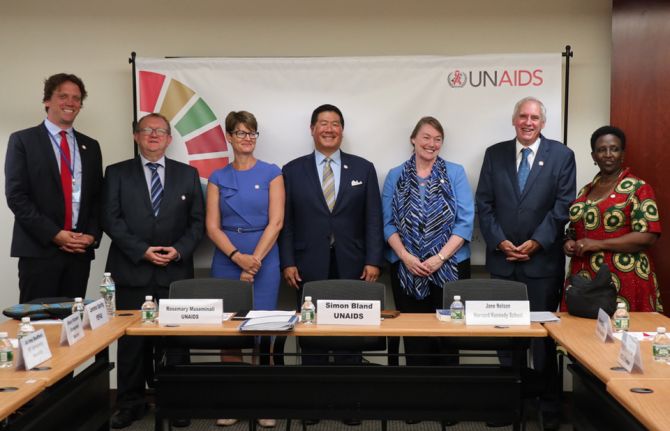

Update
Ending AIDS is everyone’s business
17 July 2018
17 July 2018 17 July 2018Business leaders have met to explore how more and better action by business can be mobilized for the AIDS response, in alignment with the work of governments, civil society and donors.
In the opening remarks, Simon Bland, Director of the UNAIDS New York Liaison Office, highlighted the recognition by United Nations Member States of the importance of the private sector in helping to deliver on the Sustainable Development Goals (SDGs), but that this was sometimes narrowly focused on finance. We know that the private sector can bring much more to the table through their networks, management expertise, supply chains and innovations. There is a growing recognition of the need to move beyond philanthropy and corporate social responsibility to embedding SDG investments within core business operations.
Jane Nelson, Director of the Corporate Responsibility Initiative at Harvard Kennedy School, shared her insights on the role of companies in expanding economic opportunity and their ongoing journey in the past 20 years, moving from philanthropy to corporate social responsibility to integration into business functions, innovation, supply chain resilience, disclosure and governance.
The ensuing discussion with executives of three leading companies delved into the solutions to ending the AIDS epidemic as a public health threat by 2030 and how collaboration could generate additional impact across the work of their businesses, governments, civil society and donors.
The event, held on 16 July during the ministerial segment of the High-Level Political Forum on Sustainable Development, in New York, United States of America, was convened by UNAIDS.
Quotes
“The AIDS epidemic is far from over. If we want to end the AIDS epidemic as part of the Sustainable Development Goals, it is important to work ever more closely with the private sector in the search for systemic solutions that bring speed, scale and sustainability to the response and to do so safely with due diligence and protections for the most vulnerable so that no one is left behind.”
“At ViiV Healthcare, we not only offer a broad portfolio of antiretroviral medicines and an industry-leading pipeline of potential treatment and prevention options, but we are also focused on developing sustainable community programmes for people living with HIV.”
“In order to end HIV as public health problem by 2030, we need to find the most effective way to prevent new cases from occurring. This challenge becomes even more crucial now that some indicators suggest increased complacency. HIV activities could do with a boost; the private sector should make this clear to all other stakeholders.”
“Achieving the 90–90–90 goals for HIV testing, treatment and eradication requires the combined forces of industry, regulators, funders and public health entities across the globe. The ability for us all to now engage, educate and catalyse the public at large is paramount to delivering on critical testing programmes.”
“Companies that have a clear understanding of their Sustainable Development Goal impacts will ultimately be better placed to unlock market opportunities, consolidate an enduring licence to operate and manage operational and regulatory risks on the path to 2030. However, achieving the Sustainable Development Goals and harnessing the potential that they represent is a complex task which is ultimately beyond the reach of any one organization.”



